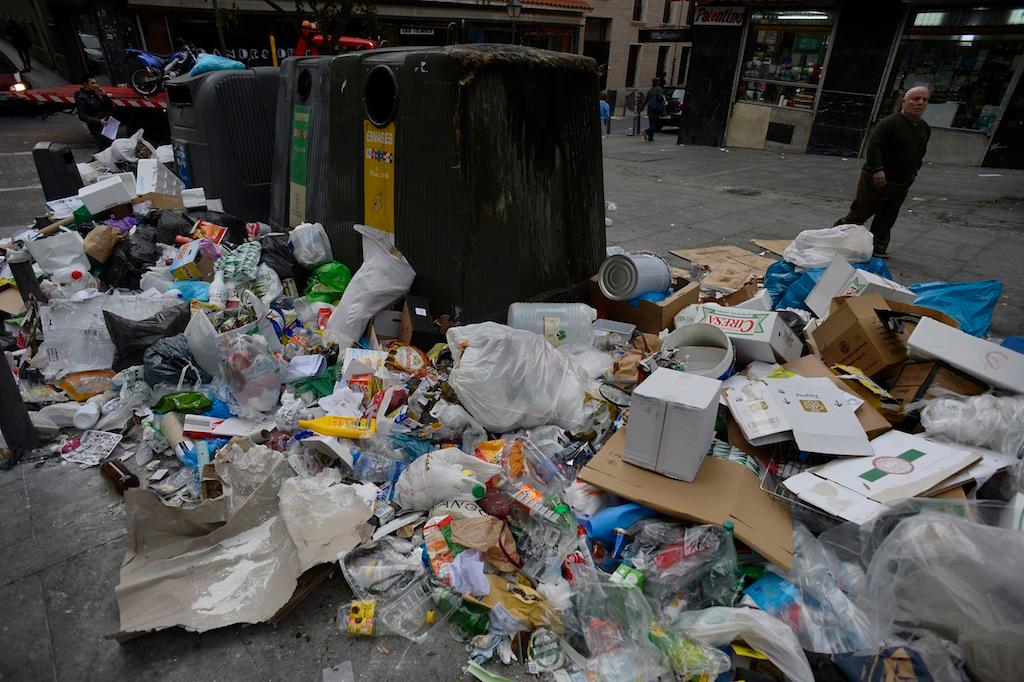The EU promises to slash carbon emissions
Environmental disasters are piling up.
VALENCIA, Spain — Hidde-Jan Lemstra strides onto the stage of a packed auditorium armed with an air of polished confidence and a snappy pitch for four judges.
He's here to sell his idea for the Unprinter, which uses a laser to remove print from paper in minutes, allowing it to be reused.
“The Royal Bank of Scotland in 2013 used 550 million sheets of paper,” he tells the crowd. “If you stack those up, that’s almost twice the height of Mount Everest.”
His device would reduce that amount considerably. “Next to every printer, there ought to be an Unprinter,” he says.
Lemstra is the head of Reduse, a UK clean-tech startup. It's one of 18 international startups here to compete for cash in the two-day final of the Best Climate Venture 2014 competition, which wrapped up last Friday.
The annual event is organized by the nonprofit group Climate-KIC, the European Union’s main climate innovation initiative.
Several hours later, Lemstra is back onstage, this time to collect a check for more than $6,000 after the audience votes his project the best.
But that’s small change compared to the more than $50,000 handed to the competition’s overall winner aQysta, which is developing a hydro-powered irrigation system.
Since launching in 2010, Climate-KIC has dedicated more than $1 billion to climate innovation. The funding followed deals signed with private, public and academic partners and grants from the European Institute of Innovation and Technology, an independent EU agency that launched Climate-KIC.
Outgoing CEO Mary Ritter says the amount of cash raised reflects a consensus across much of Europe that it will take urgent action to avoid catastrophic environmental disaster.
“People in the US are not putting a lot of money into climate change because an awful lot of people there don’t believe in it,” she says. “In contrast, the prevailing belief here is that climate change is anthropogenic, it’s been created by man and it’s pretty urgent that we do something.”
In a significant step forward, the EU last month became the first major global emitter to put its position on the table ahead of an important United Nations climate meeting in Paris next year, a follow-up to the failed Copenhagen summit five years ago.
The EU’s 28 leaders jointly agreed to slash greenhouse gas emissions by at least 40 percent compared with 1990 levels by the year 2030.
European Council President Herman Van Rompuy heralded the agreement in a tweet as the world’s “most ambitious, cost-effective, fair climate energy policy.”
But critics say key parts of the deal — which also includes 27-percent targets for renewable energy use and energy efficiency increases — remain vague or voluntary. Some question whether targets can be met, especially in coal-dependent economies such as Poland and the Czech Republic, which have balked at demands to switch to lower-impact energy sources.
Concerns have also surfaced about a revision clause that could allow EU leaders to water down the agreement if other major polluters, such as the United States and China, fail to ratify similar targets in Paris next year.
Scientists say achieving the goal of limiting the rise in average global temperatures to 2 degrees Celsius by 2050 would require an 80 percent cut in emissions. European leaders are only too aware of the uphill political battle President Barack Obama faces attempting to ratify any such treaty in a hostile US Congress.
Nevertheless, the mood across the Atlantic remains cautiously upbeat.
Joachim Schellnhuber, director of the Potsdam Institute for Climate Impact Research, says China’s rapid emergence as the key player in climate talks could help force the US into action.
“The world is not looking only to America anymore,” he says. “If China teams up with Europe, that will change the world — and then the Americans will have to jump on the bandwagon.”
More from GlobalPost: Calamity Calling: A GlobalPost investigation into climate change
Harnessing America’s entrepreneurial spirit will probably prove crucial for finding innovative solutions to climate change, Schellnhuber says.
But time is running out.
“Change is often slow and cumbersome,” he adds, which is why bringing together the “European sense of realism” and the “American go-getter mentality” is critical.
“If we keep on living as we are right now, we will deprive our grandchildren of their opportunities. It’s as simple as that.”
Every day, reporters and producers at The World are hard at work bringing you human-centered news from across the globe. But we can’t do it without you. We need your support to ensure we can continue this work for another year.
Make a gift today, and you’ll help us unlock a matching gift of $67,000!
